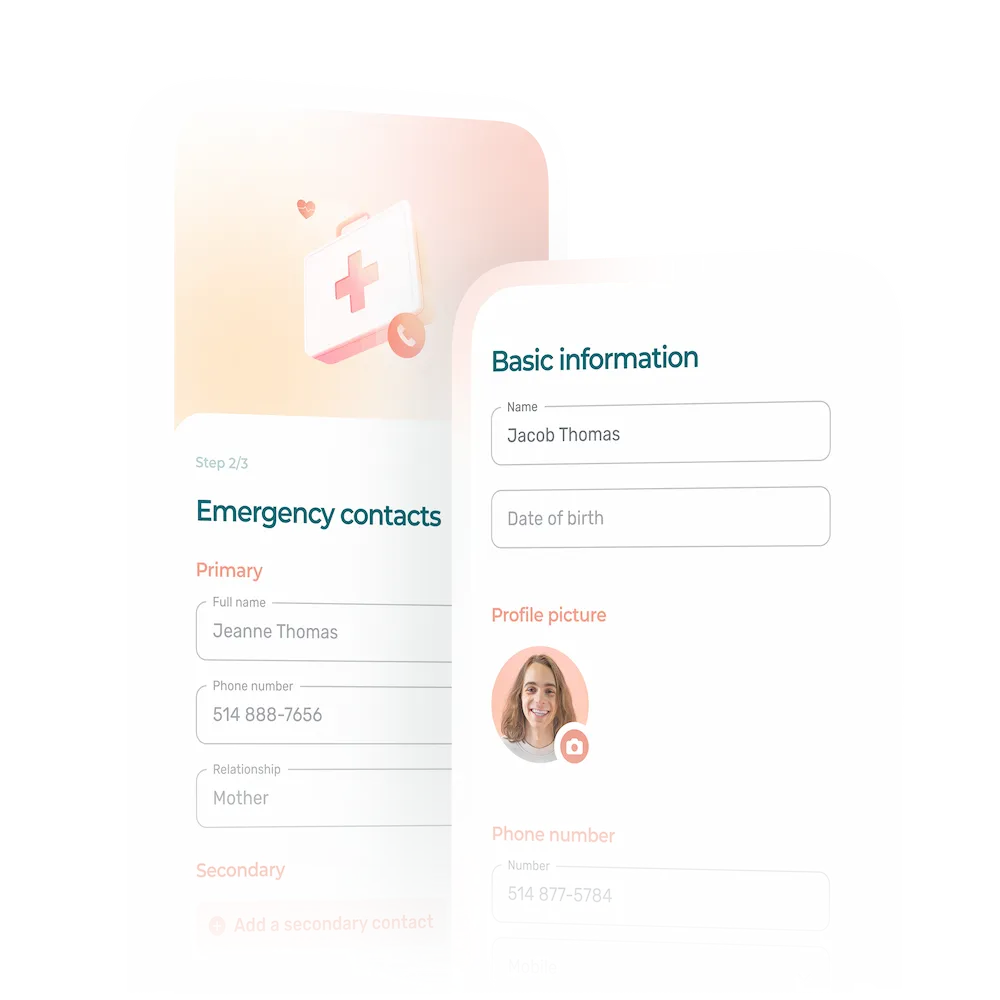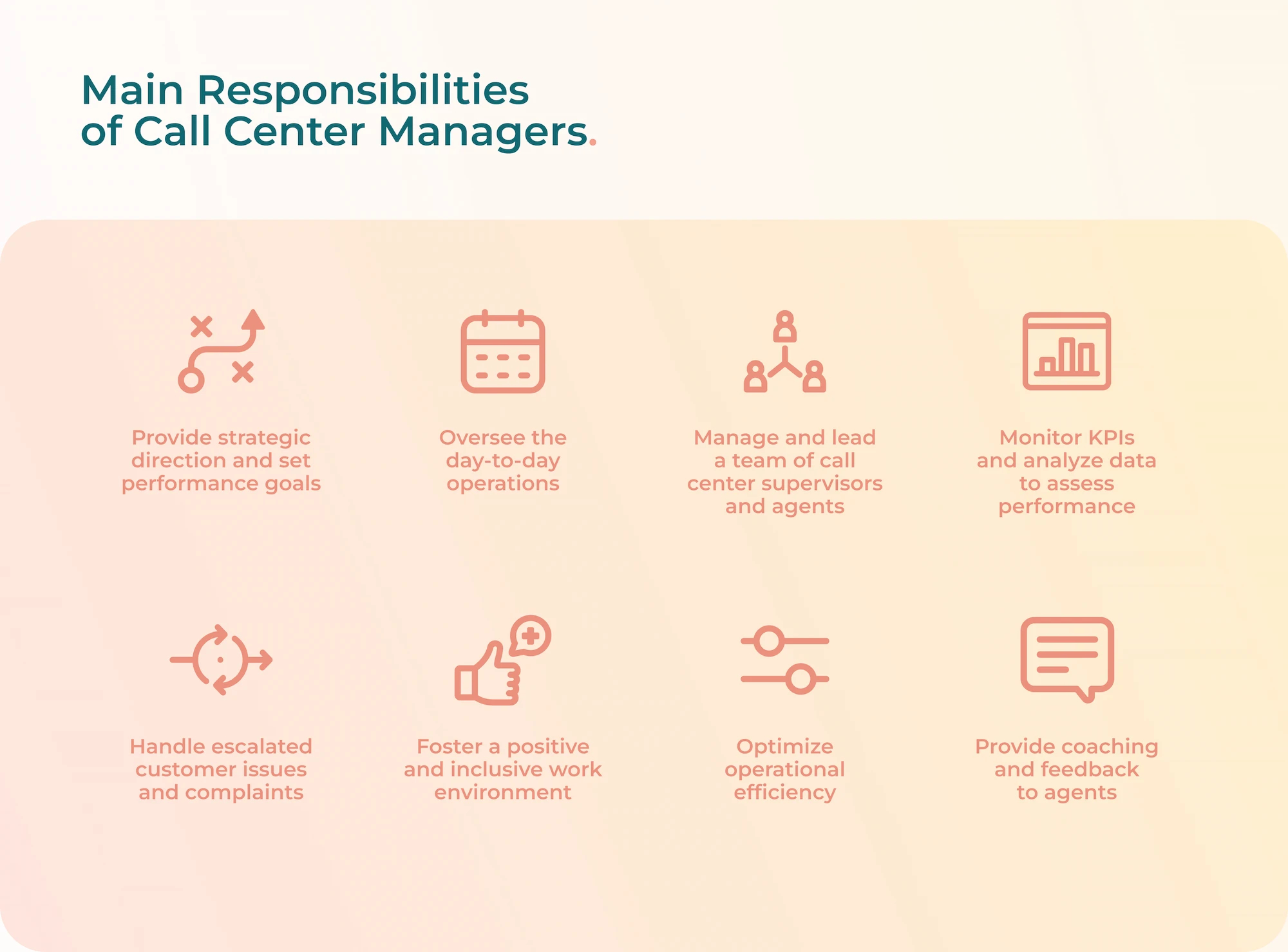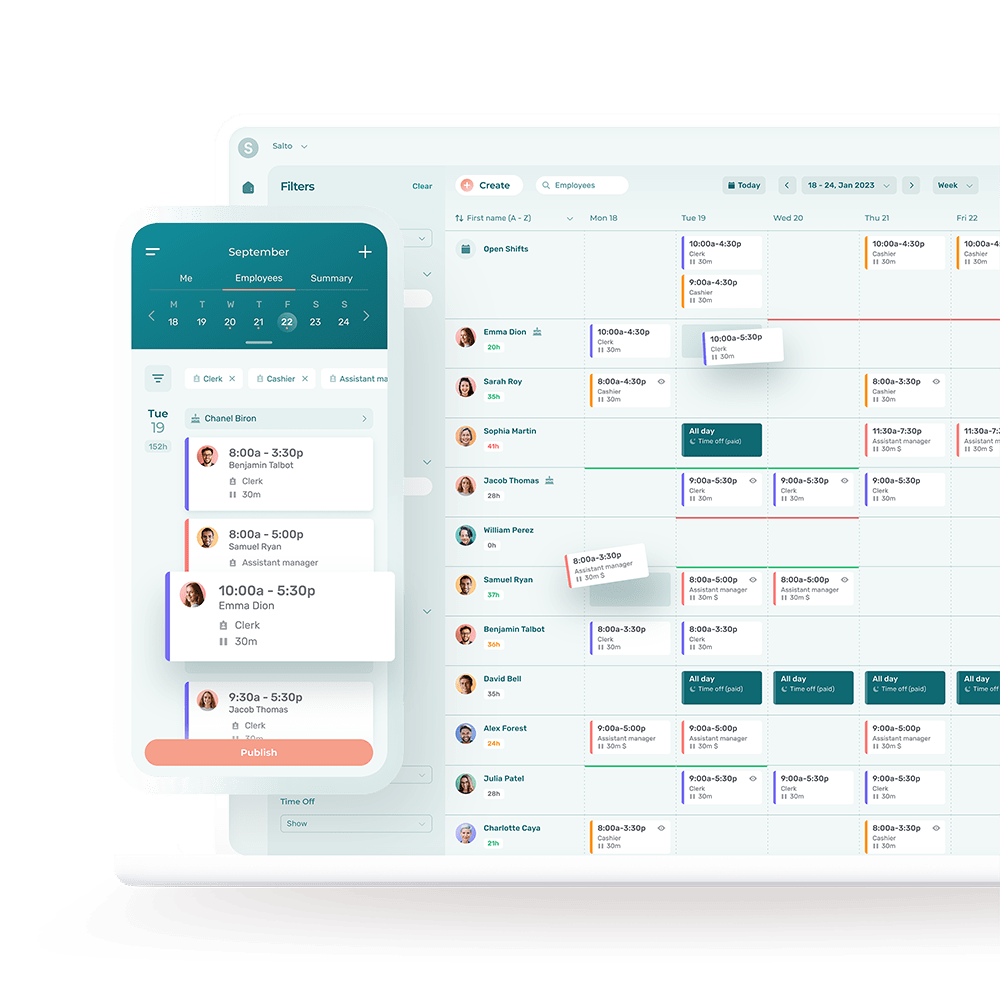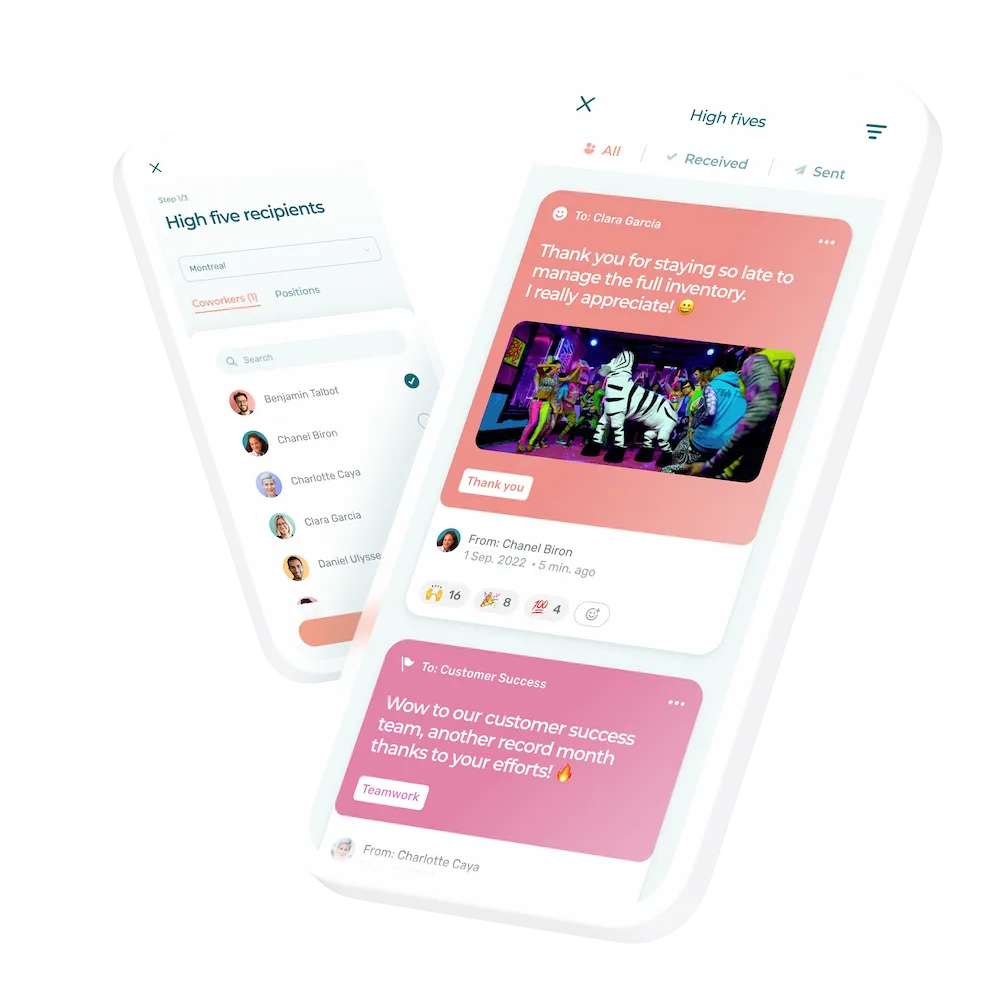Call center or contact center operations can make or break the customer experience, directly impacting a business’s brand image and profitability.
Learn best practices in call center management: How to overcome common challenges in offices & call centers, and which key performance metrics to track.
What Is Call Center Management?
Call center management refers to the process of overseeing the operations of a call center or contact center. It includes tasks such as staffing, monitoring performance metrics, ensuring quality, implementing technology, providing training, managing the customer experience, and analyzing data.
Effective call center management will optimize efficiency, enhance customer satisfaction, and meet business objectives. This takes effective leadership, strategic planning, and continuous improvement to successfully manage a call center that’s able to deliver efficient and effective customer service and support.
Call Center Hierarchy: What Are the Roles?
Below are the three key roles in a call center, although roles may vary in different organizations. Some organizations may have additional layers in their call center management team. Expectations for each role may also be influenced by the company’s specific industry, corporate culture, or customer service goals.
Call Center Manager
Call center managers are responsible for overseeing the entire call center management and operations. An effective call center manager provides strategic direction, sets performance goals, and ensures the efficient functioning of the call center.
They manage the team of supervisors and agents using call center scheduling software, handle escalated customer issues, make important decisions, and monitor key performance metrics.
Expectations of a Call Center Manager
Call center managers are expected to demonstrate strong leadership skills, effectively manage resources, optimize operational efficiency, drive performance improvement, and ensure a positive customer experience. The qualities of a good manager include excellent communication and problem-solving abilities, a deep understanding of call center processes and operations, and the ability to make data-driven decisions.
Call Center Supervisor
Call center supervisors are responsible for directly managing a team of call center employees or agents. They provide guidance, support, and coaching to agents, monitor their performance, and ensure the team meets performance targets. Supervisors handle day-to-day operations, address agent concerns, escalate complex issues to the manager, and maintain team morale.
Expectations of a Call Center Supervisor
Call center supervisors are expected to have strong leadership and interpersonal skills. They should possess excellent communication abilities to effectively convey instructions and feedback to agents. They must be good at maintaining agent productivity, ensuring adherence to quality standards, resolving conflicts, and fostering a positive work environment.
Call Center Agent
Call center agents are the frontline representatives who handle customer interactions. They address customer inquiries, provide assistance, resolve issues, and ensure customer satisfaction.
Agents utilize call center software and tools to access customer information, document interactions, and follow scripts or guidelines to deliver consistent service. They may handle inbound or outbound calls, respond to emails, chats, or social media messages.
Expectations of a Call Center Agent
Call center agents are expected to possess excellent communication skills, both verbal and written, and be able to handle customer inquiries professionally and efficiently. They should have product knowledge, understand company policies and procedures, and possess problem-solving abilities. Agents should strive to provide exceptional customer service, meet performance targets, adhere to quality standards, and maintain a positive and empathetic attitude throughout interactions.
Key Responsibilities of a Call Center Manager
Each call center will have its own specific job description, but generally, a call manager will be expected to shoulder the following key responsibilities.
- Provide strategic direction and set performance goals for the call center.
- Oversee the day-to-day operations of the call center.
- Manage and lead a team of call center supervisors and agents.
- Monitor key performance metrics and analyze data to assess call center performance.
- Implement strategies to optimize operational efficiency and improve call center performance.
- Ensure adherence to quality standards and provide coaching and feedback to agents.
- Handle escalated customer issues and complaints.
- Make data-driven decisions to drive performance improvement and enhance customer satisfaction.
- Develop and implement training programs to enhance agent skills and product knowledge.
- Stay updated with call center technologies and tools to streamline operations.
- Collaborate with other departments to address customer needs and resolve cross-functional issues.
- Generate reports and provide insights to senior management on call center performance.
- Foster a positive and inclusive work environment for the call center team.
- Stay up-to-date on industry trends and best practices in call center management.
18 Best Practices for Effective Call Center Management
Below are some best practices adopted by many successful call center management teams.
1. Train Your Agents
Why? Properly trained call center agents are better able to meet rising customer expectations.
The 2023 CX Trends Report revealed that 60% of customers choose one brand over another based on the quality of service they expect to receive.
2. Prioritize Employee Engagement
Why? Satisfied agents are more likely to provide excellent customer support.
According to a Gallup study, engaged employees have 21% higher productivity and 10% higher customer ratings.
3. Invest in Technology
Why? Integrated systems and technological tools can lead to more efficient customer service.
A PSFK survey found that 74% of people prefer to use bots rather than waiting for an agent, especially when they are querying basic information.
4. Collect Customer Feedback
Why? It lets you identify areas for improvement to lower customer churn.
The 2023 CX Trends Report shows that 73% of consumers will switch to a competitor after multiple bad experiences, and more than half will leave after just one poor experience.
5. Centralize Call Center Data
Why? It leads to better data analysis and decision-making.
A recent study by McKinsey & Company found that companies that use data-driven insights to make decisions are 19 times more likely to achieve above-average profitability.
6. Foster Collaboration Among Teams
Why? Call center management practices that promote collaboration will need to better agent product knowledge and customer support.
According to Salesforce, 86% of executives say ineffective collaboration is a major contributor to business failures.
7. Schedule Call Agents Effectively
Why? It reduces the risk of agent burnout and improves employee retention rates.
According to the 2021 Talent Retention Report, a flexible schedule is among the top three reasons cited by employees why they would leave their current employer for another job.
Lighten the administrative burden of call center management. Easily create flexible schedules, accommodate employee work preferences, and grant time-off requests with Agendrix office attendance app and call center management software.
8. Collaborate With the Recruiting Team
Why? It ensures you hire skilled customer support agents.
The call center turnover rate reached 42% in 2021, highlighting the importance of strategic hiring practices.
9. Stay Up to Date on Regulations and Privacy Guidelines
Why? It will help avoid violations of call center regulations, which can result in legal penalties, reputation damage, and loss of customer trust.
Companies that illegally call numbers on the National Do Not Call Registry or place an illegal robocall can currently be fined up to $43,792 per call.
10. Create Self-Service Resources for Customers
Why? It empowers customers and reduces call volume.
35% of consumers say it’s very important to have access to a fully self-serve customer care option when resolving issues, according to the Emplifi Report.
11. Establish Etiquette Guidelines for Agents
Why? It standardizes the customer service process and ensures call center agents treat customers respectfully and effectively.
12. Reward Agents With Performance Incentives
Why? This financial motivation boosts agent performance.
According to a report by Achievers, recognition for achievements is the second biggest reason employees stay with a company, after work-life balance.
13. Do Regular Quality Assurance Checks
Why? It lets you identify areas for improvement and provide necessary training.
Quality assurance monitoring can help increase first-call resolution rates by identifying areas where agents may require additional training or support.
14. Develop Call Center Standard Operating Procedures (SOPs)
Why? It ensures consistent operations and performance.
SOPs can improve efficiency by ensuring a consistent customer experience.
15. Encourage Innovation
Why? Embracing out-of-the-box thinking and technology improves customer service.
According to an IBM report, organizations that embrace open innovation have a 59% higher rate of revenue growth compared to those that don’t.
16. Collect Agent Feedback
Why? It gives you valuable insights on improving processes and addressing operational issues.
Employees who feel their opinion matters are 4.6 times more likely to perform better, according to Forbes.
17. Break Down Data Silos
Why? It improves the customer experience.
The 2023 CX Trends Report found that 72% of business leaders believe that merging teams and responsibilities around the customer experience will increase efficiency.
18. Anticipate Common Call Center Challenges
Why? It makes it easier to maintain a high level of customer service even when dealing with high staff turnover rates, low budgets, and high call volumes.
This HRO Today report claims 63% of HR leaders are extremely or moderately concerned about employee turnover.
Metrics to Track in Call Center Operations
Call center management teams routinely use the following call center metrics to gain valuable insights into call center performance, agent efficiency, customer satisfaction, and operational effectiveness. Tracking and analyzing these metrics can help identify areas for improvement and drive overall success in call center operations.
Average Handle Time (AHT)
AHT measures the average duration of a customer interaction, including talk time, hold time, and any after-call work performed by the agent. It indicates the efficiency of agents in handling customer calls.
Formula
AHT = (Total Talk Time + Total Hold Time + Total After-Call Work Time) / Total Number of Calls
First Call Resolution (FCR)
FCR measures the percentage of customer inquiries or issues resolved during the initial contact without the need for further follow-up or escalation. It reflects the effectiveness of agents in providing prompt solutions.
Formula
FCR = (Number of Calls Resolved on First Contact) / (Total Number of Calls) * 100
Customer Satisfaction Score (CSAT)
CSAT measures customer satisfaction based on their feedback or ratings after a support interaction. It provides insights into the overall quality of service provided by the various call center employees.
Formula
CSAT = (Number of Positive Ratings) / (Total Number of Survey Responses) * 100
Service Level
Service Level represents the percentage of calls answered within a specified time threshold, usually expressed as a percentage and a time frame. It measures the call center’s ability to handle incoming calls promptly.
Formula
Service Level = (Number of Calls Answered within X Seconds) / (Total Number of Calls Offered) * 100
Abandonment Rate
Abandonment Rate indicates the percentage of callers who hang up or abandon their calls before reaching an agent. It reflects the effectiveness of call center staffing and wait time management.
Formula
Abandonment Rate = (Number of Abandoned Calls) / (Total Number of Calls Offered) * 100
Cost per Call
Cost per Call measures the average cost incurred by the call center to handle each customer interaction. It includes expenses related to agent salaries, technology, infrastructure, training, and other operational costs. It reflects the call center’s operational efficiency and cost-effectiveness.
Formula
Cost per Call = Total Cost of Call Center Operations / Total Number of Calls
Transfer Rate
Transfer Rate measures the percentage of calls that are transferred from one agent or department to another within the call center. It indicates the efficiency of call center technology and call routing, as well as the need for multiple transfers, which may impact customer satisfaction and resolution time.
Formula
Transfer Rate = (Number of Transferred Calls) / (Total Number of Calls Handled) * 100
See why Agendrix is the best call center employee scheduling software for managers who want to simplify and automate their workforce management needs.
3 Biggest Challenges Call Centers Face & How to Address Them
Call center management teams often face the same challenges. These include:
1. Balancing Cost and Quality
Challenge: Balancing cost and quality involves finding the right equilibrium between delivering exceptional customer service and optimizing operational costs. The challenge lies in allocating resources efficiently while maintaining high service levels and customer satisfaction. Cutting costs excessively may compromise service quality while prioritizing quality without considering cost efficiency can lead to budget constraints.
Impacts of balancing cost and quality:
- According to Forrester, a 1% improvement in customer experience (CX) can lead to a revenue increase of up to $1 billion for Fortune 1000 companies.
How to address and mitigate the challenge of balancing cost and quality
- Implement workforce management tools and analytics to optimize staffing levels and schedule agents based on call volume patterns and peak times.
- Conduct regular performance reviews and quality assessments to identify areas for improvement and training needs.
- Explore self-service options and automation technologies to handle routine inquiries, reducing agent workload and cost per call.
- Continuously evaluate and streamline processes to eliminate inefficiencies and optimize resource allocation.
- Implement cost-effective call center technologies, such as cloud-based solutions, to reduce infrastructure and maintenance costs.
- Monitor and analyze key performance metrics to identify cost-saving opportunities while ensuring service quality.
- Encourage agents to focus on first call resolution and efficient call handling to minimize call durations and increase productivity.
2. Maintaining Security and Compliance
Challenge: Call centers handle sensitive customer data and must adhere to strict security and compliance regulations. Ensuring data protection, privacy, and compliance with industry standards can be a complex challenge. Failure to maintain security and compliance can lead to reputational damage, legal consequences, and loss of customer trust.
Impacts of maintaining security and compliance:
- The 2022 Cost of Data Breach Report by IBM states that the average total cost of a data breach is $4.35 million.
- 81% of consumers would cease engaging with a brand online after a data breach according to Ping Identity.
How to address and mitigate the challenge of maintaining security and compliance
- Implement robust data security measures, including secure access controls, encryption, and regular security audits.
- Provide comprehensive training to agents on data protection, privacy regulations, and compliance requirements.
- Develop and enforce strict policies and procedures to govern data handling and customer privacy.
- Implement call recording and monitoring tools to ensure compliance with regulatory requirements.
- Regularly update and review security protocols to align with evolving industry standards and best practices.
- Conduct regular internal and external audits to identify vulnerabilities and address security gaps.
- Maintain open communication with legal and compliance teams to stay up-to-date with changing regulations.
3. High Agent Turnover
Challenge: High agent turnover impacts operations as it disrupts team dynamics, increases training costs, and leads to a loss of valuable knowledge and experience. It can result in decreased productivity, lower customer satisfaction, and increased recruitment and onboarding efforts.
Impacts of high agent turnover:
- A Quality Assurance & Training Connection study benchmarks the average call center agent turnover rate ranges between 30%-45%.
- The Society for Human Resource Management states that the cost of replacing an employee can range from 50% to 60% of their annual salary.
How to address and mitigate the challenge of high agent turnover
- Implement a thorough recruitment and selection process to hire candidates with the right skills and cultural fit for the call center.
- Provide comprehensive and ongoing training programs to equip agents with the necessary skills and knowledge.
- Foster a positive work environment by promoting employee engagement, recognition, and career growth opportunities.
- Conduct regular feedback sessions and performance evaluations to address concerns and provide support to agents.
- Offer competitive compensation and benefits packages to attract and retain talented agents.
- Implement strategies to improve work-life balance and reduce agent stress levels.
- Focus on building strong team relationships and fostering a sense of belonging.
Conclusion
Contact center management is a highly complex puzzle. The proper scheduling of contact center agents is just one of many moving parts.
Fortunately, there are well-established best practices, key performance indicators, call center software and other technological tools that offices and contact centers can use to overcome common challenges and improve their management strategy.
Successful call center management will improve daily call center operations and let you answer more phone calls to deliver high quality customer service. Whether it’s an outbound call center or an inbound call center, at the end of the day, it’s all about better customer relationship management.
What Is the Best Way to Manage a Call Center?
By following best practices, call center managers can effectively manage their teams, optimize operations, deliver exceptional customer experiences, and drive overall success in the call center environment.
Here are some best practices for effective call center management:
- Clear and open communication: Establish open lines of communication with agents, supervisors, and other stakeholders. Regularly communicate goals, expectations, and changes within the call center. Encourage feedback and suggestions to foster a collaborative environment.
- Comprehensive training and development: Provide thorough training programs to equip agents with the necessary skills and knowledge. Offer ongoing development opportunities to enhance their expertise and keep them up to date with industry trends and best practices.
- Performance monitoring and metrics: Implement performance monitoring systems and track key metrics to assess call center performance. Analyze data to identify trends, areas for improvement, and opportunities to enhance efficiency and customer satisfaction.
- Effective workforce management: Optimize call center scheduling and staffing to ensure adequate coverage based on call volume patterns. Utilize workforce management tools to forecast demand, schedule breaks, and manage agent availability efficiently.
- Technology integration: Leverage call center software and technologies to streamline operations, improve call routing, and enhance the customer experience. Integrate call center tools with other business systems, such as CRM software, to access relevant customer information and provide personalized service.
- Continuous coaching and feedback: Provide regular coaching and feedback sessions to support agent development and improve performance. Address strengths and areas for improvement constructively and recognize achievements to boost morale.
- Quality assurance and customer experience: Implement quality assurance processes to monitor and evaluate agent interactions for adherence to standards and customer satisfaction. Focus on delivering exceptional customer experiences through empathetic and efficient service.
- Employee engagement and recognition: Foster a positive work environment by promoting employee engagement and recognition. Offer incentives, rewards, and opportunities for career growth to motivate agents and increase retention.
- Continuous improvement and innovation: Encourage a culture of continuous improvement and innovation within the call center. Encourage agents to share ideas and suggestions for process enhancements, customer service improvements, and technological advancements. Use employee surveys to simplify this process.
- Customer feedback and surveys: Collect customer feedback through surveys, post-call surveys, and other feedback channels to gauge satisfaction levels and identify areas for improvement. Actively listen to customer concerns and address them promptly. When possible, allow call center employees to provide anonymous responses to manager feedback questions to get a more accurate picture of the situation.
- Adaptability and flexibility: Remain adaptable to changing customer needs, market trends, and technological advancements. Embrace new tools and strategies to stay ahead of the curve and meet evolving customer expectations.
- Compliance and data security: Ensure compliance with data protection and privacy regulations. Implement robust security measures to safeguard customer data and maintain customer trust.
What Are the Levels of Management in a Call Center?
A call center management team typically consists of multiple levels to ensure effective supervision, support, and decision-making.
Specific titles and levels may vary across different call centers and organizations. Some call centers may have additional layers of management, such as assistant managers or shift supervisors, depending on the size and complexity of the call center operations.
Here are the common levels of call center management:
Call Center Agent
Call center agents are the frontline representatives who handle customer interactions. They are responsible for addressing customer inquiries, resolving issues, and providing support.
Team Leader or Supervisor
Team leaders or supervisors oversee a group of call center agents. They provide guidance, support, and coaching to agents, monitor their performance, and ensure the team meets performance targets. Supervisors handle day-to-day operations, address agent concerns, and escalate complex issues to higher levels of management.
Call Center Manager
Call center managers are responsible for overseeing the entire call center operation. They provide strategic direction, set performance goals, and ensure the efficient functioning of the call center. Managers direct the team of supervisors and agents, handle escalated customer issues, and monitor key performance metrics.
Call Center Director
Call center directors have a broader scope of responsibility and oversee one or multiple call center operations. They are responsible for setting the strategic vision, goals, and policies for call center operations. Directors focus on high-level decision-making, performance analysis, and driving continuous improvement across the call center organization.
Call Center Executive or Vice President
Call center executives or vice presidents hold top-level leadership positions in the call center organization. They provide overall strategic direction, establish long-term goals and objectives, and make critical decisions regarding call center operations. Executives collaborate with other senior leaders within the organization and align call center strategies with the broader business goals.
What Is the Best Call Center Software?
There is no one-size-fits-all answer to what is the best call center scheduling software, as the choice depends on various factors such as the specific needs, size, and industry of the call center.
When choosing a call center scheduling software, the call center management team should:
- Assess the specific requirements and goals of the call center.
- Consider scalability, integration capabilities, ease of use, and customer support provided by the software vendor.
- Verify that it includes time-saving and employee retention features such as:
-
-
- Centralized employee records
- Time & attendance tracking
- Timesheet management
- Internal communication platform
- Ability to manage multiple job sites
- Various ways to clock
- High fives feature for recognizing employee achievements and good deeds
- Onboarding process
-
- Conduct thorough research, read customer reviews, and evaluate demos or trial versions to make an informed decision based on the call center’s unique needs.
See how Agendrix call center scheduling software can simplify staff management.
What Do Call Center Managers Do?
Call center managers play a critical role in delivering exceptional customer experiences while driving operational efficiency.
The responsibilities of a call center manager encompass a wide range of tasks, including:
Team Management
Call center managers are responsible for supervising and leading the call center team. This involves hiring, training, and coaching call center agents, as well as conducting performance evaluations and providing feedback to support their professional development.
Performance Monitoring
Managers track key performance metrics and monitor call center performance to ensure that targets and service level agreements are met. They analyze data and implement strategies to improve efficiency, productivity, and customer satisfaction.
Resource Planning
Managers handle workforce management by determining staffing requirements, creating schedules, and optimizing agent allocation to align with call volume patterns and business needs. They ensure adequate coverage and make adjustments as necessary to maintain service levels.
Process Improvement
Call center managers identify areas for process improvement and implement strategies to enhance operational efficiency. They analyze workflows, identify bottlenecks, and propose solutions to streamline processes and optimize productivity.
Customer Experience Management
Managers focus on delivering exceptional customer experiences by implementing strategies to enhance customer satisfaction and loyalty. They ensure that agents provide effective and empathetic support, handle escalated customer issues, and implement customer feedback mechanisms.
Technology and Systems Management
Managers oversee the implementation and maintenance of call center software and technologies. They collaborate with IT teams to ensure that systems are functioning optimally, troubleshoot technical issues, and explore opportunities to leverage emerging technologies to improve operations.
Reporting and Analysis
Managers generate reports and analyze call center data to assess performance, identify trends, and provide insights to higher management. They use data-driven insights to make informed decisions, set goals, and develop strategies for continuous improvement.
Team Collaboration
Managers foster collaboration and effective communication within the call center and across departments. They collaborate with other teams, such as IT, HR, and marketing, to align call center operations with broader organizational goals and initiatives.
Budgeting and Cost Management
Managers are responsible for managing the call center budget, including staffing costs, technology investments, and operational expenses. They analyze cost metrics and implement cost-saving strategies without compromising service quality.
Compliance and Quality Assurance
Managers ensure that the call center operates in compliance with regulatory requirements and industry standards. They implement quality assurance programs to monitor and maintain service quality, conduct audits, and ensure adherence to privacy and data protection guidelines.














